【Leetcode】重排链表、旋转链表、反转链表||
发布时间:2023年12月28日
目录

💡重排链表
题目描述
给定一个单链表?L?的头节点?head?,单链表?L?表示为:
?L0?→ L1?→ … → Ln-1?→ Ln?
请将其重新排列后变为:
L0?→?Ln?→?L1?→?Ln-1?→?L2?→?Ln-2?→ …
不能只是单纯的改变节点内部的值,而是需要实际的进行节点交换。
提示:
- 链表的长度范围为?
[1, 5 * 104] 1 <= node.val <= 1000
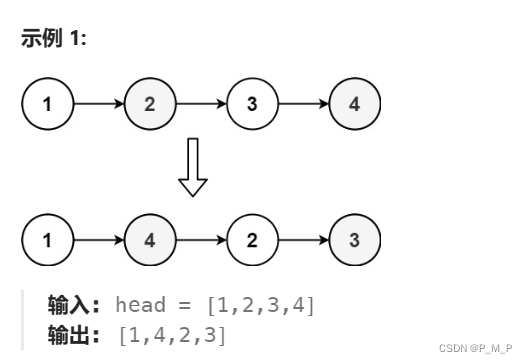
方法一:
将链表的每一个节点存在数组里,然后用下标访问的方式,交叉连接。

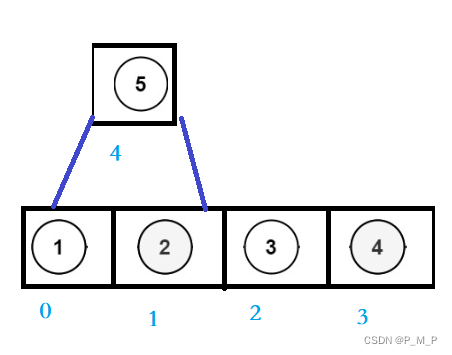
/**
* Definition for singly-linked list.
* struct ListNode {
* int val;
* struct ListNode *next;
* };
*/
typedef struct ListNode ListNode;
void reorderList(struct ListNode* head){
if(head->next==NULL||head->next->next==NULL)
return;
ListNode* arr[50001];
ListNode* cur=head;
int n=0;
while(cur)
{
arr[n]=cur;
cur=cur->next;
n++;
}
int i=0;
int j=n-1;
while(i<j)
{
arr[i]->next=arr[j];
i++;
arr[j]->next=arr[i];
j--;
}
arr[i]->next=NULL;
}方法二:
可以先用快慢指针的方法找到链表的中间节点,然后将中点后的链表翻转成一个新的链表,最后将这个新链表和原链表切割掉中间节点之后的链表合并成一个新的链表,合并方式是交叉合并。


/**
* Definition for singly-linked list.
* struct ListNode {
* int val;
* struct ListNode *next;
* };
*/
typedef struct ListNode ListNode;
ListNode* MiddleNode(ListNode* head)
{
ListNode* fast=head;
ListNode* slow=head;
while(fast!=NULL&&fast->next!=NULL)
{
fast=fast->next->next;
slow=slow->next;
}
return slow;
}
ListNode* ReverseList(ListNode* head)
{
ListNode* phead=NULL;
ListNode* cur=head;
while(cur)
{
ListNode* tmp=cur->next;//注意先后顺序
cur->next=phead;
phead=cur;
cur=tmp;
}
return phead;
}
void reorderList(struct ListNode* head){
ListNode* mid=MiddleNode(head);
ListNode* phead=ReverseList(mid->next);
mid->next=NULL;
ListNode* cur=head;
while(phead)
{
ListNode* next=cur->next;
cur->next=phead;
ListNode* tmp= phead->next;
phead->next=next;
phead=tmp;
cur=cur->next->next;
}
}💡旋转链表
题目描述
给你一个链表的头节点?head?,旋转链表,将链表每个节点向右移动?k?个位置。
提示:
- 链表中节点的数目在范围?
[0, 500]?内 -100 <= Node.val <= 1000 <= k <= 2 * 109
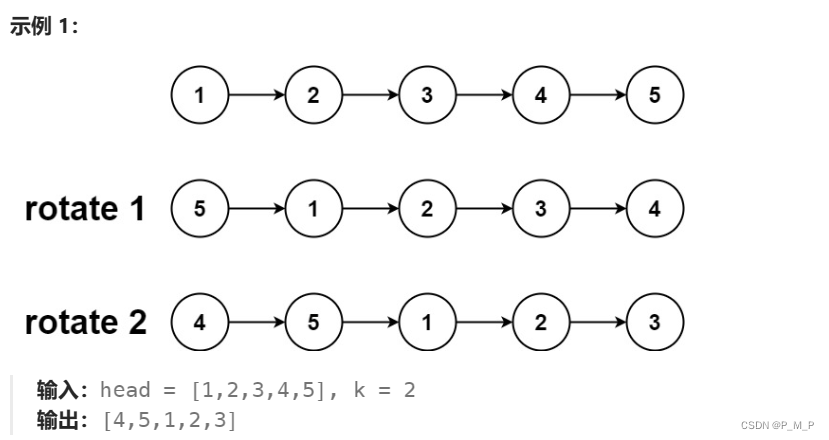
方法:
要求每个节点向右移动k位置,其实就是将倒数k个结点接在头节点之前,倒数第k个结点成为新的头节点,但是这里需要对k进行处理,因为k可能大于链表长度,所以k=k%len,还有一个需要注意的就是当k==len时,是不需要进行任何操作的,直接返回头节点就可以了。

/**
* Definition for singly-linked list.
* struct ListNode {
* int val;
* struct ListNode *next;
* };
*/
typedef struct ListNode ListNode;
struct ListNode* rotateRight(struct ListNode* head, int k) {
if(head==NULL||k==0)
return head;
ListNode* cur=head;
ListNode* prev=head;
ListNode* ret=head;
int l=0;
while(ret)
{
ret=ret->next;
l++;
}
k=k%l;
if(k==0)
return head;
while(k--)
{
cur=cur->next;
}
while(cur->next)
{
cur=cur->next;
prev=prev->next;
}
ListNode* Next=prev->next;
cur->next=head;
prev->next=NULL;
return Next;
}💡反转链表||
题目描述
给你单链表的头指针?head?和两个整数?left?和?right?,其中?left <= right?。请你反转从位置?left?到位置?right?的链表节点,返回?反转后的链表?。
提示:
- 链表中节点数目为?
n 1 <= n <= 500-500 <= Node.val <= 5001 <= left <= right <= n
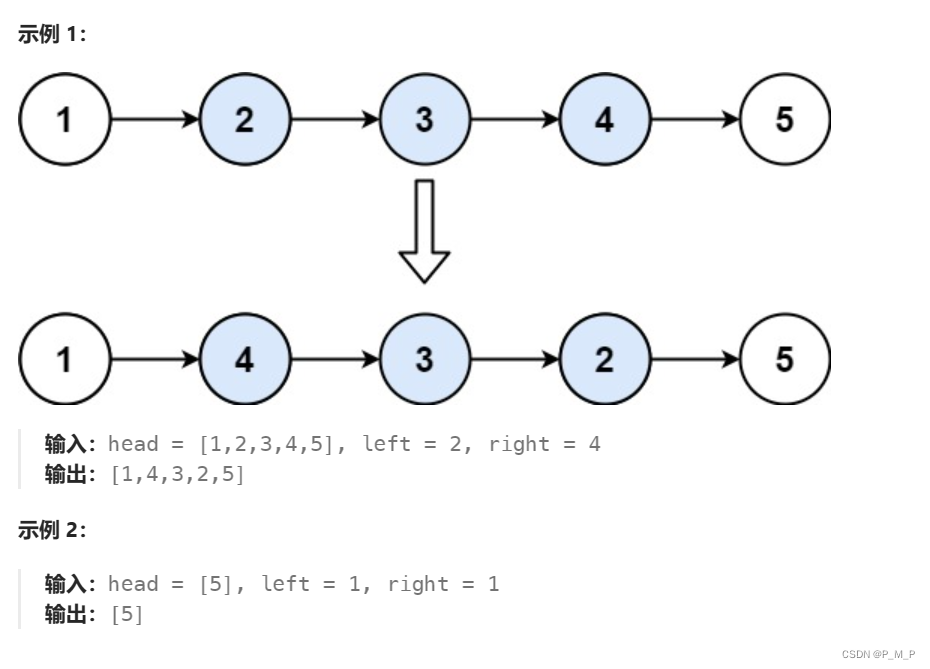
方法:
我的方法就是将区间[left,right]之间的结点翻转,然后与原来区间前后的结点重新连接起来。

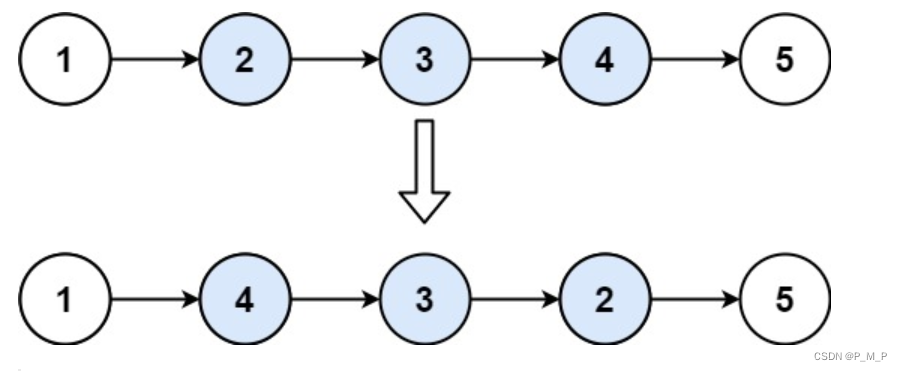
/**
* Definition for singly-linked list.
* struct ListNode {
* int val;
* struct ListNode *next;
* };
*/
typedef struct ListNode ListNode;
struct ListNode* reverseList(struct ListNode* head,struct ListNode* tail)
{
ListNode*phead=NULL;//新的头
ListNode*cur=head;
while(cur!=tail)//遍历原链表
{
ListNode*next=cur->next;//保存下一个节点的地址,避免丢失
cur->next=phead;
phead=cur;//更新头节点
cur=next;//继续遍历
}
return phead;
}
struct ListNode* reverseBetween(struct ListNode* head, int left, int right) {
ListNode* cur1=head;
ListNode* cur2=head;
int cnt=1;
while(cnt<left-1)
{
cur1=cur1->next;
cur2=cur2->next;
cnt++;
}
while(cnt<=right)
{
cur2=cur2->next;
cnt++;
}
ListNode* tail=NULL;
if(cur2!=NULL)
tail=cur2;
if(left==1)
head=reverseList(cur1,cur2);
else
cur1->next=reverseList(cur1->next,cur2);
while(cur1->next)
{
cur1=cur1->next;
}
cur1->next=tail;
return head;
}
💡总结
链表相关的题目还是要注意细节,结点之间的切割与连接要特别仔细,不然任意造成空结点,或者成环导致死循环。
文章来源:https://blog.csdn.net/w050423/article/details/135253278
本文来自互联网用户投稿,该文观点仅代表作者本人,不代表本站立场。本站仅提供信息存储空间服务,不拥有所有权,不承担相关法律责任。 如若内容造成侵权/违法违规/事实不符,请联系我的编程经验分享网邮箱:chenni525@qq.com进行投诉反馈,一经查实,立即删除!
本文来自互联网用户投稿,该文观点仅代表作者本人,不代表本站立场。本站仅提供信息存储空间服务,不拥有所有权,不承担相关法律责任。 如若内容造成侵权/违法违规/事实不符,请联系我的编程经验分享网邮箱:chenni525@qq.com进行投诉反馈,一经查实,立即删除!
最新文章
- Python教程
- 深入理解 MySQL 中的 HAVING 关键字和聚合函数
- Qt之QChar编码(1)
- MyBatis入门基础篇
- 用Python脚本实现FFmpeg批量转换
- React Hooks 面试题 | 01.精选React Hooks面试题
- C编程指针篇----包括历年真题
- SpringBoot之YAML文件的使用
- vue和react的区别是什么
- Python量化交易——股票择时到底能否赚钱?技术指标大比拼——CMO指标
- webpack常用配置
- 代码随想录算法训练营第20天 | 654.最大二叉树 617.合并二叉树 700.二叉搜索树中的搜索 98.验证二叉搜索树
- 【特纳斯电子】基于单片机的防酒驾检测系统设计-实物设计
- Redis取最近10条记录
- GPS时钟系统、北斗卫星同步时钟、NTP时间服务器